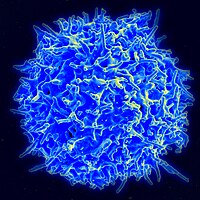
Photo from wikipedia
Haematologic malignancies account for a large proportion of cancers worldwide. The high occurrence and mortality of haematologic malignancies create a heavy social burden. Allogeneic haematopoietic stem cell transplantation is widely… Click to show full abstract
Haematologic malignancies account for a large proportion of cancers worldwide. The high occurrence and mortality of haematologic malignancies create a heavy social burden. Allogeneic haematopoietic stem cell transplantation is widely used in the treatment of haematologic malignancies. However, graft-versus-host disease and relapse after allogeneic haematopoietic stem cell transplantation are inevitable. An emerging treatment method, adoptive cellular therapy, has been effectively used in the treatment of haematologic malignancies. T cells, natural killer (NK) cells and tumour-infiltrating lymphocytes (TILs) all have great potential in therapeutic applications, and chimeric antigen receptor T (CAR-T) cell therapy especially has potential, but cytokine release syndrome and off-target effects are common. Efficient anticancer measures are urgently needed. In recent years, double-negative T cells (CD3 + CD4 − CD8 − ) have been found to have great potential in preventing allograft/xenograft rejection and inhibiting graft-versus-host disease. They also have substantial ability to kill various cell lines derived from haematologic malignancies in an MHC-unrestricted manner. In addition, healthy donor expanded double-negative T cells retain their antitumour abilities and ability to inhibit graft-versus-host disease after cryopreservation under good manufacturing practice (GMP) conditions, indicating that double-negative T cells may be able to be used as an off-the-shelf product. In this review, we shed light on the potential therapeutic ability of double-negative T cells in treating haematologic malignancies. We hope to exploit these cells as a novel therapy for haematologic malignancies.
Journal Title: Biomarker Research
Year Published: 2022
Link to full text (if available)
Share on Social Media: Sign Up to like & get
recommendations!